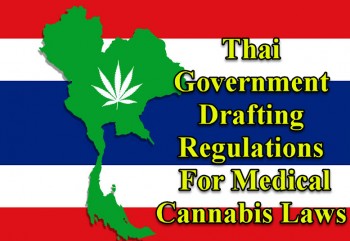
A newly introduced bill could triple the number of medical cannabis retail stores and make the use of cannabis oil legal for patients in Georgia. Georgia's legislative chamber is looking for effective ways to boost productivity in the legal, medical cannabis sector. A bill, which the state's House committee has already passed, could be the state's best option for multiplying the current number of medical cannabis permits in the state by three. If this bill is signed into law, medical cannabis patients will also have the choice of opting for cannabis oil.
Improving Georgia's Medical Cannabis Program
The state's medical cannabis program has remained at a standstill for some years. The proposed bill would be an effort to stimulate more activities within the program. The Atlanta Journal-Constitution explained that this lack of action could be blamed on the never-ending disputes among competing businesses in the sector. The majority of these disagreements stem from a lack of licenses to produce and dispense cannabis-derived drugs to registered patients.
The approval of this bill in the house and senate would mean that the state medical program would issue up to 22 licenses to medical cannabis companies. The number of available permits today is 6. The newly issued licenses will be awarded to six approved companies months back. According to the proposed measure, all licenses would be given before or on June 30. Then the companies will be granted a hearing to make preparations before opening their doors to customers.
If this bill is passed, Georgia will have 22 companies producing, extracting, processing, and selling cannabis and cannabis oil. It is essential to mention that all cannabis flowers and derived products must not have more than 5% THC levels. THC is the psychoactive cannabinoid in cannabis plants.
The main aim of medical cannabis is to improve the quality of life of various patients. With cannabis drugs and oil, patients who have cancer, chronic pain, and depression can have a shot at getting relief. Different studies have shown that cannabis oil can be used to manage conditions like terminal cancers and Parkinson's disease.
The new bill would expand the program to draw in more residents. So far, Georgia only has over 25,000 registered patients in its medical cannabis program. Many of these existing patients have complained in recent months that they preferred using cannabis oil. However, the state has not allowed registered patients to use it. A sizable number of the cannabis migrants who acquire their products outside Georgia do so because they have no legal way of buying their oils here.
The Growth Of The Medical Cannabis Industry
Medical cannabis was officially legalized in 2015. The measure, known as Haleigh's Hope Act, decriminalized medical cannabis and made possession of products containing up to 5% THC legal. The regulators of the program have made very few changes to the program since it was rolled out seven years ago.
The Journal-Constitution explained that the sluggish rollout of the industry pushed away potential medical cannabis candidates while forcing some new and exciting customers to purchase products like cannabis oil from the black market. Looking at it from another angle, this could not have been avoided because not all residents can afford to cross borders in search of medical cannabis.
A few months before the pandemic started, precisely in 2019, the state had yet to appoint any credible candidate to the Georgia Access to Medical Cannabis Commission. This group is a seven-person board that makes all the decisions about the medical program. They are charged with overseeing the program and keeping the operators in check. They also select the companies that get licensed to cultivate and sell medical cannabis.
The commission itself was established about four years into the program. It was born of a bill that the Governor, Brian Kemp, signed in 2019. That measure amended the previous bill that prohibited the production of cannabis oil in the state. Since then, producers licensed by the commission have extracted and processed cannabis oil for distribution. Most of the oils were transported to other states because the oil failed to legalize cannabis oil for medical patients.
When signing the 2019 measure, the Republican governor sympathized with patients across the state. He explained that he had met with dozens of children suffering from chronic, life-threatening diseases. "I've met with and heard from the parents of these children also," Kemp said. He revealed that most of these patients had complained about having no access to the drug and being on the verge of losing hope of getting relief for their children. The 2019 compromise measure gave only the very sick access to medical cannabis oil. Children, in particular, who are afflicted with debilitating diseases, At the time, critics and advocates described the act as the best thing to do.
The Georgian Access to Medical Cannabis Commission officially began accepting applications for cannabis producers in late 2020. About six months passed before these licenses were finally issued in 2021. Out of 69 companies who applied for the permits, the commission's authority voted unanimously to select only 6. The Atlanta Journal-Constitution disclosed that each license gave each company the authority to set up five different dispensaries in the state.
The majority of these companies are yet to officially open their businesses as the commission gave them a year to sort through their businesses and begin operations. During this period, the Journal-Constitution reported that losing bidders were protesting the selections made by the commission. All six companies will start operations before August to provide much-needed drugs to patients suffering from multiple seizures, cancers, and other terminal diseases.
Conclusion
The new bill would put different activities in motion within the medical program. It is most certainly one or more steps forward in a cannabis medical program that has been stalled for years. Whether or not the commission would open up its closed bidding process to the general public if this bill is approved is still unknown. Now, there's hope that the frustrating delays in the program will be a thing of the past. But that can only be possible if the bill is voted unanimously into law.






